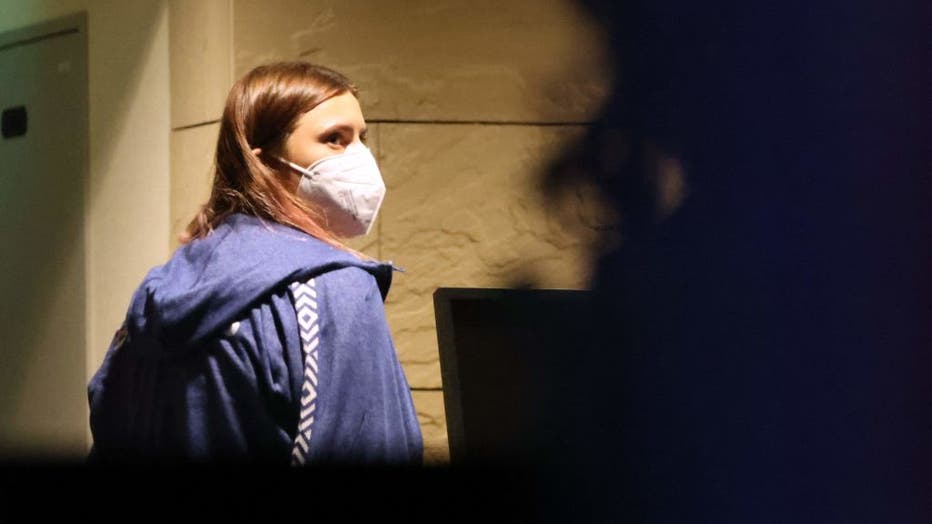Belarus sprinter granted Polish visa says ‘punishment’ awaited her at home
MOSCOW - A Belarusian Olympic sprinter who had a public feud with officials from her team at the Tokyo Games said Tuesday that authorities "made it clear" she would face punishment if she returned home to an autocratic government that has relentlessly stifled any criticism.
Waiting to leave Japan to seek refuge in Europe, Krystsina Tsimanouskaya said she hopes she can continue her career, but for now, her safety is the priority. After she criticized the management of her team on social media, she accused officials of hustling her to the airport and trying to put her on a plane back to Belarus.
In the dramatic standoff, several countries offered her help, and Poland granted her a humanitarian visa Monday. She plans to fly to Warsaw later in the week, according to an activist group that is supporting her.
Team officials "made it clear that, upon return home, I would definitely face some form of punishment," the 24-year-old sprinter told The Associated Press in a video call interview from Tokyo. "There were also thinly disguised hints that more would await me."
She added that she believed she would be kicked off of the national team. She hopes to be able to continue running once she has reached safety.
"I would very much like to continue my sporting career because I’m just 24, and I had plans for two more Olympics at least," she said. But "for now, the only thing that concerns me is my safety."

Belarus athlete Krystsina Tsimanouskaya, who claimed her team tried to force her to leave Japan following a row during the Tokyo 2020 Olympic Games, walks with her luggage inside the Polish embassy where she was granted a humanitarian visa to Poland,
Asked what made her fear she would be in danger at home, Tsimanouskaya said that "the key phrase was that ‘we didn’t make the decision for you to go home, it was decided by other people, and we were merely ordered to make it happen.’"
She added that she's worried about her parents, who remain in Belarus. Her husband, Arseni Zdanevich, left the country and is in Ukraine.
The standoff began after Tsimanouskaya’s criticism of how officials were managing her team set off a massive backlash in state-run media back home, where the government has cracked down on dissent since a presidential election a year ago triggered a wave of unprecedented mass protests.
The runner said on Instagram that she was put in the 4x400 relay even though she has never raced in the event. She was then barred from competing in the 200 meters.
Tsimanouskaya waged — and lost — a legal fight to run in that event. The Court of Arbitration for Sport said in a statement that it denied Tsimanouskaya’s request for an interim ruling that would have allowed her to run at the Olympic Stadium on Monday. The heats were held in the morning and the semifinals were in the evening.
On Tuesday, Tsimanouskaya called for an investigation and suggested possible "sanctions against the head coach who approached me and who deprived me of the right to compete in the Olympic Games." She said she wanted international sports authorities "to investigate the situation, who gave the order, who actually took the decision that I can’t compete anymore."
At the same time, she said that "the athletes aren’t guilty of anything, and they should keep competing."
Belarus’ authoritarian government has at times gone to extremes in its crackdown on dissent, including recently diverting a plane to the capital of Minsk and arresting a journalist aboard. Authoritarian President Alexander Lukashenko maintained that there was a bomb threat against the flight, but European officials denounced the move as an act of air piracy.
Lukashenko appears to have a particular interest in his country's Olympic team: He and his son, Viktor, have led the Belarus National Olympic Committee for more than 25 years.
Both Lukashenkos are banned from the Tokyo Olympics by the International Olympic Committee, which investigated complaints from athletes that they faced reprisals and intimidation during the crackdown following the wave of anti-government protests over the last year.
Athletes seeking asylum at global sporting events is nothing new — such requests were especially frequent during the Cold War but they have also happened occasionally in the decades since.
But Tsimanouskaya’s circumstances appear to differ from the typical situation, though some have accused her of planning to flee to Europe all along. Tsimanouskaya dismissed that, saying events in Tokyo forced her hand.
"Everything that is happening now absolutely wasn’t in my plans," Tsimanouskaya said. She said she only spoke out when she learned she would be competing in an event she had never competed in — but couldn't see how that led to her being asked to go home.
Still, the athlete declined to link her problems to the larger struggle in Belarus.
"I don’t want to get involved in politics," she said. "For me, my career is important, only sports is important, and I’m only thinking about my future, about how I can continue my career."

